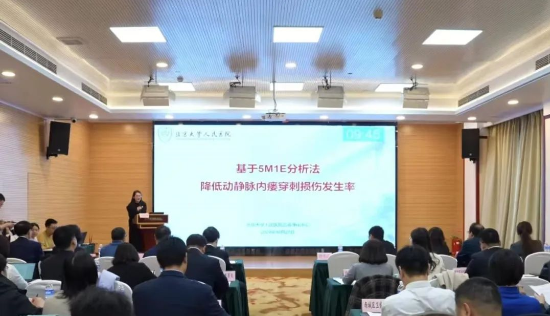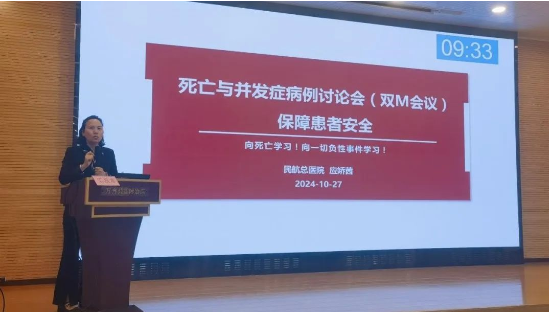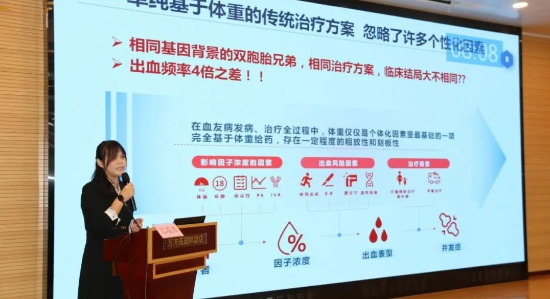On October 27, the Beijing Municipal Health Commission and Health News jointly held the finals of the first “Beijing Excellent Case Competition for Improving Medical Quality”. The competition is a concrete measure to implement the three-year action plan (2023-2025) led by the National Health Commission and the National Administration of Traditional Chinese Medicine to comprehensively enhance medical quality. By gathering and showcasing outstanding cases in medical management and technological innovation from various medical institutions, the competition aims to further elevate the quality and service standards of healthcare in Beijing.


The competition, launched in May this year, was designed with two parallel groups: "medical management" and "technological innovation." This setup highlights the principle of innovation and inheritance for medical quality improvement. Thirty cases advanced to the final on-site presentation and defense, where evaluation experts, along with representatives from health administrative departments and medical institutions across various districts, scored the presentations. In the end, 2 first prizes, 4 second prizes, 6 third prizes, 8 excellence awards, and several individual and organizational management awards were presented in both the medical management and technological innovation categories. These cases showcase the dedicated efforts and significant progress of various medical institutions in Beijing in both management and innovation within the medical field.

Since the launch of the three-year action plan to comprehensively improve medical quality in 2023, the Beijing Municipal Health Commission has established over 50 municipal quality control centers and more than 300 district-level centers through its "weaving network" initiative. Together, they form a three-tiered medical quality control network, encompassing the city, district, and individual institution levels, characterized by hierarchical responsibility, phased management, expert participation, and cooperation, covering all medical and health institutions in Beijing. The commission has continued to address challenges in medical services, conducting special inspections of institutions with high patient complaint rates and carrying out "flight inspections"—both open and unannounced—to assess medical quality, prompt corrections of medical institutions on problems, and further strengthen patient safety and medical quality. Focused on patient’s need, the commission has introduced information technology solutions, such as online diagnosis and treatment, online access to test reports and medical images, e-receipts, electronic hospitalization orders, and same-day discharge settlements, to enhance medical quality and service accessibility. Through organizing this case competition, the commission provides a platform for learning and communication among medical institutions. Showcasing exemplary cases of medical quality enables institutions to learn from each other, identify and address gaps in service, and collectively improve care for the community.


Zhong Dongbo, Secretary of the Party Committee of the Beijing Municipal Health Commission, commended the cases shortlisted for the finals and congratulated the winning medical institutions and participants. He highlighted that the outstanding cases demonstrated a strong response to policy, a people-centered approach, problem-solving focus, full engagement across roles and professions, comprehensive application of diverse technologies, and data-driven insights. He emphasized three key directions for Beijing's healthcare system: first, to promote comprehensive medical quality management and foster an industry-wide culture of continuous improvement; second, to drive innovation by enhancing quality productivity in healthcare through management innovation and technological advancement; and third, to further refine and innovate work methods, explore breakthroughs in biotechnology, contribute to the improvement of medical quality, and deliver better, more efficient healthcare services to the public.
List of winners
(I) Medical Management Group
First Prize (1 institution)
Civil Aviation General Hospital
Second Prize (2 institutions)
Peking University First Hospital
Beijing Cancer Hospital
Third Prize (3 institutions)
Peking Union Medical College Hospital, Chinese Academy of Medical Sciences
Peking University People's Hospital
Beijing Friendship Hospital, Capital Medical University
Excellence Award (4 institutions)
Peking University Third Hospital
China-Japan Friendship Hospital
Beijing Tsinghua Chang Gung Hospital
Children's Hospital, Capital Institute of Pediatrics
(II) Science and Technology Innovation Group
First Prize (1 institution)
Beijing Children's Hospital, Capital Medical University
Second Prize (2 institutions)
Beijing Anding Hospital, Capital Medical University
Beijing Cancer Hospital
Third Prize (3 institutions)
Peking University People's Hospital
Xuanwu Hospital, Capital Medical University
Peking Union Medical College Hospital, Chinese Academy of Medical Sciences
Excellence Award (4 institutions)
Peking University First Hospital
Beijing Emergency Center
Peking University Third Hospital
Beijing Luhe Hospital, Capital Medical University
(III) Individual Award
Best Performance Award (tied)
Shi Di, Peking Union Medical College Hospital, Chinese Academy of Medical Sciences
Ying Jiaoqian, Civil Aviation General Hospital
Best Medical Management Award
Beijing Cancer Hospital
Best Technology Innovation Award
Beijing Children's Hospital Affiliated to Capital Medical University
Most Promotional Value Award
Civil Aviation General Hospital
Peking Union Medical College Hospital, Chinese Academy of Medical Sciences
(IV) Best Organizational Management Award
Peking Union Medical College Hospital, Chinese Academy of Medical Sciences
Peking University Third Hospital
Xuanwu Hospital, Capital Medical University
Beijing Tsinghua Chang Gung Hospital
Beijing Cancer Hospital
Beijing Anding Hospital Affiliated to Capital Medical University
